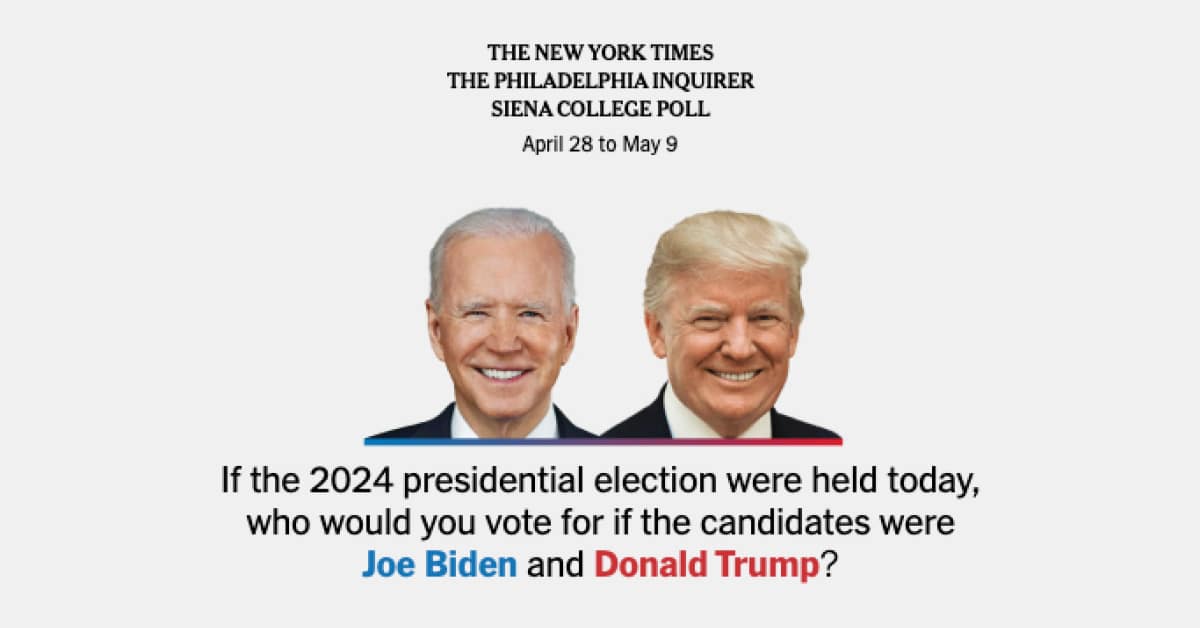On Monday, the New York Times and Siena College released their latest presidential battleground poll, covering six key swing states (AZ, GA, MI, NV, PA, and WI). The headline: among likely voters in these states, Donald Trump led Joe Biden 42%-36%, leading the President in five of six states (Biden led by one in MI), even as Democratic candidates for Senate led or tied in the states they tested.
The “good” news for Biden in this poll is that 42% + 36% ≠ 100%, and many voters either remain undecided or say they are supporting a third-party candidate—with independent Robert F. Kennedy, Jr. at a particularly notable 9%.
If Kennedy manages to get 9% in this election, it would be the highest share for a third-party candidate since 1992. But who are Kennedy’s voters (and which of the two major-party candidates are they pulling from)?
A Profile of Kennedy’s Voters
We can glean a few insights from diving into the crosstabs provided by NYT/Siena for likely voters (note: they also have a registered voter sample, but we just look at the likely voters).
Demographically, Kennedy supporters look a little more like Biden voters than Trump voters. Regarding religious affiliation, 35% of Kennedy voters are so-called “nones,” as are 39% of Biden voters (compared to just 18% of Trump voters).
Kennedy voters are more ethnically diverse than either Biden or Trump supporters—36% are voters of color, compared to 31% of Biden voters and 20% of Trump voters. And they’re also quite young: a majority (53%) are under age 45, compared to just 30% of Biden and Trump voters.
That said, in terms of educational attainment, they look closer to Trump voters—just 32% have a bachelor’s degree, compared to 30% of Trump voters and 46% of Biden voters.
When asked which of the two major-party candidates would do better on a range of issues, they give mixed answers: they prefer Biden by a wide margin on abortion, 60%-23% (note: 71% say they believe abortion should be legal in all or most cases), but they prefer Trump on the economy (68%-22%) and Israel/Palestine (51%-24%). The Israel response is especially interesting, as they are much more divided in their sympathies than Trump’s supporters—when asked which side of the conflict they sympathized with more, a small plurality chose the Israelis over the Palestinians, 35%-28%. Trump voters said they sympathized with Israelis by an overwhelming margin, 70%-6%, while Biden voters were likelier to say their sympathies were with the Palestinians, 33%-25%.
Kennedy supporters who voted in 2020 backed Biden over Trump 49%-40%; if forced to decide between the two today, they would back Trump 42%-33%. Roughly half would consider voting for Trump; just 38% say the same about Biden. 41% of Kennedy voters say they lean towards the Democratic Party, while 39% lean towards the Republicans. A majority (51%) identify as moderates, while 17% self-ID as liberal and 27% identify as conservative. In Senate races, they prefer the Democratic candidate by an 11% margin (46%-35%).
What sets these voters most apart is their belief in the brokenness of the American political system. When asked whether they prefer a candidate who promises “to bring politics in Washington back to normal” or one who promises to “fundamentally change America,” majorities of both Biden (71%) and Trump (50%) voters prefer a candidate who promises normalcy. Not so among Kennedy voters—they prefer a change-agent, 58%-34%. And when asked how much change the political and economic system in America needs, 80% of Kennedy supporters say either that the system needs major changes or that it needs to be torn down entirely.
Key Takeaways
Like Perot in ’92, it is unclear that either major-party candidate truly benefits from Kennedy’s presence in the race—he pulls more from Biden’s 2020 voters—but his supporters seem to prefer Trump to Biden this year, even as they favor Democratic candidates for Senate. From their demographic profile, a portrait emerges of who these voters are—the median Biden-to-Kennedy voter is likely a young, moderate person of color; they are relatively less religious; and they’re fundamentally anti-system. They find Trump appealing but are less attracted to the social conservatism. This type of voter fit comfortably within the Obama coalition but has been cross-pressured during the Trump years.
Overall, Kennedy’s presence may not be the worst thing for Democrats. While it would be ideal to keep all of these voters in the Biden tent, Kennedy provides a release valve for dissatisfied Biden 2020 voters, an option other than just staying home (which would hurt downballot Democrats) or supporting Trump. At the same time, Kennedy pulls from Trump many of the anti-establishment, low-social trust voters who flocked to him in the past two election cycles—a group, I will note, that has been remarkably difficult for pollsters to find, which should lead us to question whether polls could be underestimating Kennedy’s support.


